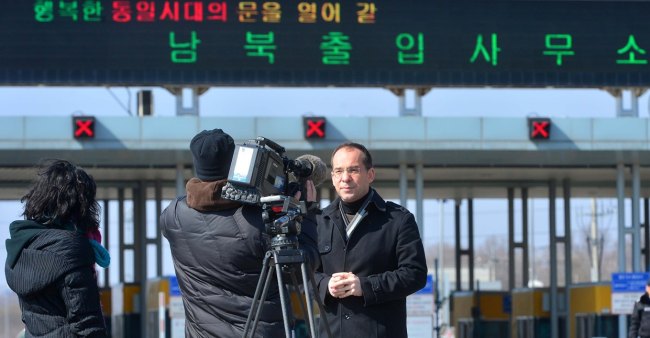Foreigners neither blase nor scared by N.K. bluster
By Korea HeraldPublished : April 10, 2013 - 17:55

Whether watching the cavalcade of North Korean provocations unfold on a flat screen TV in New York City or iPad in London, those not living in Seoul find themselves scratching their head at the juxtaposition between goose-stepping soldiers in Pyongyang and Gangnam-style teeny boppers in the South.
In fact, Gangnam Style singer Psy even has a sold out concert planned for the coming weekend.
Not nearly as alarmed as their friends and relatives in the United States and Europe, nor as blase as South Koreans inured to North Korea’s bombast, most expatriates here fall somewhere in the middle: feeling safe but a little concerned.
“I feel very relaxed. I think it’s not the first time and it will not be the last time it happens. John Kerry is supposed to come this week, and if this gentleman is coming, it should be quite safe,” said Andre Nothomb, chief executive of Solvay Korea, a ceramics and chemicals company. “What North Korea has been saying is irrational. Some 100,000 foreigners can’t just leave Korea because it might fire a missile today or sometime later.”
Nothomb is one of nearly one and a half million non-Koreans who call Korea home as either long-term residents or short-term expatriates. The foreign residents here comprise nearly 3 percent of the total population.
“I feel safe because I have confidence in the Park Geun-hye government,” said Paraguayan Ambassador to Korea Ceferino Valdez. “They know the region, they know the people; they have been dealing with these provocations for 60 years. They know how to deal with North Korea.”
Those provocations turned apoplectic recently over United Nations sanctions following its third nuclear test on Feb. 12 and over ongoing U.S. and South Korean joint military exercises.
Among other statements, it has threatened to launch a nuclear strike against the U.S., declared it has scrapped the Korean War Armistice and warned foreigners to evacuate from the South for their own safety.
“We are Israelis. It takes more than threats to intimidate Israelis,” said Israeli Ambassador to Korea Tuvia Israeli. “On the other hand, when they declared openly they will launch a nuclear war on the United States that was something else, even for crazy people.”
“We get regular news from the French Embassy, and the latest was saying there is no risk in the current situation. Of course, it’s just advice. No one knows what will happen, but if anything happens, our officials will let us know,” said Julien Provot-Ragueneau, senior executive officer of brand development at Millet Edelweiss Holdings, a clothing company.
“I lived in Japan during the tsunami, so I’m used to risks. I don’t know which one is worse, but I don’t feel particularly unsafe at the moment.”
North Korea is still not nearly as attention hogging as “Gangnam Style” at the peak of its popularity last summer.
While the litany of provocations has made North Korea the subject of news headlines around the world, Seoul’s fuming neighbor is just one of many subjects competing for the attention of the expatriate public.
However, some expatriates here took a more cautious approach to the current situation.
“In Africa we have a saying: It’s better to do something and nothing happens than to do nothing and something happens,” said Kenyan Ambassador to Korea Ngovi Kitau. “But for now the situation seems safe. There is no reason we should create panic among the public.”
“I worry. The probability of a real conflict is low, but every time the confrontation intensifies that low probability increases a little bit,” said Dennis Florig, a 62-year-old school teacher and 20-year resident of Seoul.
“I tell my students it is like the children’s fairy tale about the boy who cried wolf. Yes, we have all heard these warnings before, like the boy often crying wolf. But I remind them that at the end of that story there actually was a wolf.”
By Philip Iglauer
(ephilip2011@heraldcorp.com)
-
Articles by Korea Herald









![[KH Explains] Naver’s Line dilemma: Lose global footing for cash?](http://res.heraldm.com/phpwas/restmb_idxmake.php?idx=644&simg=/content/image/2024/05/14/20240514050624_0.jpg&u=)
![[Herald Interview] Carbon breakthrough in Korea: Making diamonds at atmospheric pressure](http://res.heraldm.com/phpwas/restmb_idxmake.php?idx=644&simg=/content/image/2024/05/14/20240514050559_0.jpg&u=20240514184059)








